More than 53,000 NHS patients removed from dentist lists
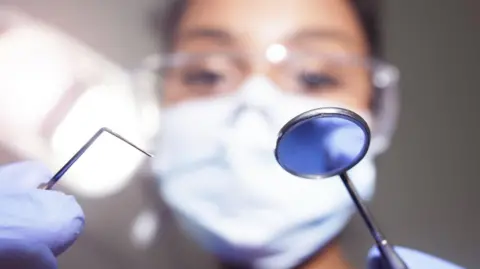 Getty Images
Getty ImagesDentists in Northern Ireland have removed more than 53,000 NHS patients from their practice lists over the past two years, BBC News NI has learned.
During 2023 and 2024, 114 dentists handed back their NHS contracts to the Department of Health (DoH), with many of these now doing private work only.
Out of the 360 dental practices in Northern Ireland, only two are now fully NHS.
Peter Corkish said he was shocked to get a letter three weeks ago to sign up to a private plan from their dentist: "My wife has rung numerous dentists and everybody's saying the same, that they're only taking on private patients."
Figures obtained by BBC News NI show that in 2023, dentists removed 12,924 NHS patients from their practices – but that figure reached 40,980 last year.
The figures also revealed that up to January this year, there were 192,780 fewer patients registered with a dentist.
That figure includes "lapsed" patients who have not attended their dentist for some time, and have fallen off the registration list.
Some patients have been offered the chance to sign up to private dental payment plans, which cover basic check-ups and cleaning, with charges for extra treatments depending on the amount of money they have to pay in each month.
Mr Corkish, from Ballymoney, County Antrim, said he and his wife had tried to find other NHS dentists in their town and in nearby Coleraine and Ballymena but have had no luck.
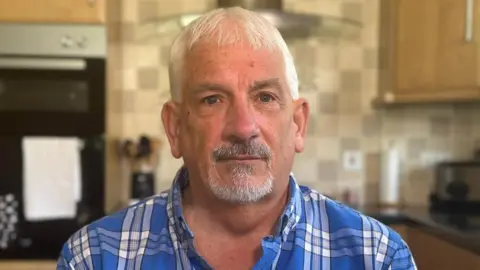
"It said that as of 1 July, the dental practice we're with is no longer offering that National Health Service and we're being given the option if we want to stay with them, to either obtain a dental plan or to just register as a normal private patient," he explained.
"Nobody's catering for National Health Service (patients) anymore.
"There's one question I would like to put to local politicians and MPs and ask them is this the end of national health dental treatment within Northern Ireland?"
'Huge demand' for NHS practices
Kegan Lewis has the only dental practice in Dungiven, County Londonderry.
It is a predominantly health service practice with about 95% of its 4,500 to 5,000 patients receiving NHS treatment.
Ms Lewis said she faces "huge demand" from patients wishing to register with an NHS practice as "more and more practices leave the health service", but her surgery is at capacity.
She said that if her practice can no longer provide NHS dental care, there will be "vulnerable groups" unable to access a dentist.
Ms Lewis said NHS dentistry is a "highly regulated service" which follows a "high-volume, low margin model".
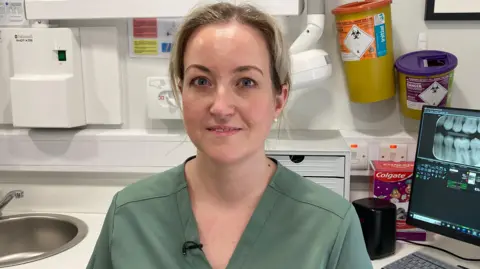
"It's a professional service and that does create a cost burden for a dental practice to operate," she said.
"The fees are set by the Department of Health, but increasingly, these fees just don't cover the cost of being open and providing service to our patients."
Private care 'unnecessarily expensive'
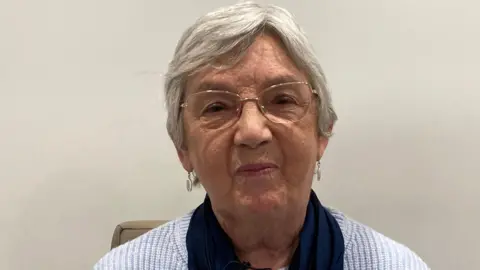
One of Ms Lewis's patients, Dorothy Hegarty, said she would "prefer to rely on the NHS rather than go privately".
"I just think it's very expensive and probably unnecessarily expensive," she said.
"People who have low income... shouldn't have to wait longer than the likes of me that maybe could go privately if I wanted to or had to."
Mrs Hegarty said if her dentist closed in Dungiven it would be "quite serious" and have a "major impact" on a lot of people.
Dentists' costs 'astronomical'
The dentists' union - the British Dental Association (BDA) - has warned there may be further erosion of NHS services as the cost of delivering them means many dental practices are becoming financially unviable.
The DoH has been in a stand-off with the BDA over reforming the payments made to dentists.
Last year, the department said £9m was to be invested in dental services in Northern Ireland.
However, the BDA says that falls short of what is required and is calling for further reform.
Dr Ciara Gallagher, chair of the BDA's Northern Ireland committee, said the set-up and running costs dentists are facing are "astronomical" and the DoH's payments do not reflect these.
"You're in an impossible situation where you have to choose between accepting a patient who needs care or the viability of your business," she said.
Dr Gallagher said the Health Minister Mike Nesbitt's pledge for reform by 2027 was welcome but did not deal with the current problems.
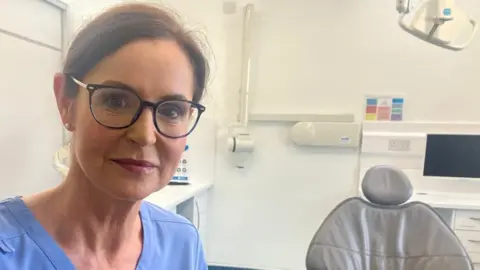
Patients with urgent dental problems can be treated under the Dental Access Scheme, which was set up for unregistered patients, asylum seekers and refugees.
There are 34 practices signed up to the scheme - which represents less than 10% of Northern Ireland dental practices.
The BBC has made several requests for an interview with Northern Ireland's Chief Dental Officer, Caroline Lappin, but she was not made available.
In a statement, the DoH said the decrease in registered patients was down to people falling off dentists' lists because of not having attended for two years and practices not registering new patients.
It said dentists were under no obligation to register health service patients.
There had been investment in dental access schemes, which had also led to almost 34,000 children becoming registered with a dentists since June 2024, it said.
The department added that a review of dental services was under way, but said the budget allocated "is not sufficient to meet the needs of the current service, let alone introduce the kind of transformative change that is needed".
